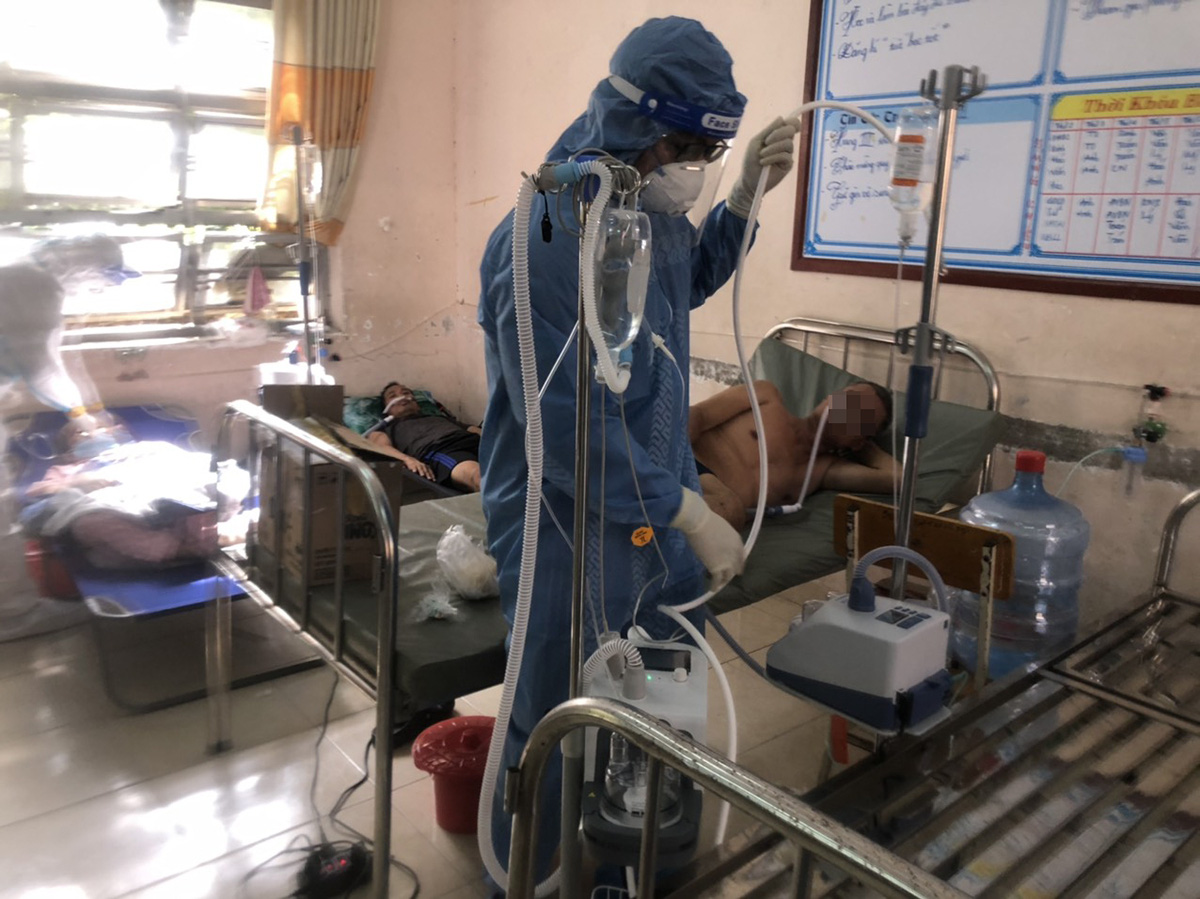It is no walk in the park for Vietnamese doctors to take care of mentally ill people infected with COVID-19 as these patients are often unpredictable and their psychiatric conditions cause them to reject treatment.
According to health workers treating COVID-19 patients with psychiatric issues, the patients usually refuse to take medicine, do not wear a mask, cause troubles, escape medical facilities, and even jump off buildings.
Unpredictable patients
The COVID-19 Thu Duc Hospital in Ho Chi Minh City recently admitted a COVID-19 male patient, who was transferred from a lower-level hospital with a warning about his manifestations of mental illness.
Following his admission, the patient wandered around the isolation area despite being asked to return to his room many times by medical staff, before somehow managing to avoid security guards and climb the fence to flee to his home in Tan Phu District only 11 hours later.
In Binh Chanh District, its field hospital for COVID-19 treatment has received 12 psychiatric patients infected with the virus since it was put into operation in July, according to Dr. Nguyen Viet Thinh, a specialist at the hospital.
Nine of them were already discharged upon their recovery from the viral disease.
“Caring for a normal COVID-19 patient is tough, but it is much more difficult and dangerous to take care of COVID-19 patients with mental illness, especially schizophrenia,” Dr. Thinh said as he referred to a recent case of a 37-year-old male patient with schizophrenia from the same district.
While medical staff were away to have lunch, the man went out of his ward, climbed to the second floor of the building, and jumped down, resulting in a broken leg and arm, Dr. Thinh recalled.
Doctors then immediately skipped their meal and rushed to give the patient first aid before transferring him to 115 People’s Hospital in District 10 for further treatment.
Due to their mental instability, many patients wandered around the field hospital, against medical staff’s request to stay inside their wards, Dr. Thinh said.
They cannot distinguish between areas for medical staff and patients.
It is also very difficult to make them wear face masks or oxygen masks.
Further, they are vulnerable to malnutrition due to a lack of self-awareness and failure to feed themselves.
“When doctors gave them milk, they even threw the cartons at the doctors,” Dr. Thinh said.
“They even managed to cross the barricade to break into doctors' room when they were sleeping.”
Understanding the patients’ conditions, health workers are usually on alert all day.
Nguyen Cao Huy Thanh, a student at the University of Medicine and Pharmacy at Ho Chi Minh City, who directly cares for many psychiatric patients with COVID-19, said that he was a bit worried when he began the job with no experience.
After a period, Thanh has realized that such patients are generally kind, except when having a panic attack.
Thanh has also learned some tactics to easily deal with his unpredictable patients, including seeking help from their family members or roommates in persuading them to take medicine and listening and talking to them in a gentle manner during health checks.
Priority for COVID-19 treatment
People with chronic mental illness or a history of depression or anxiety disorders that had been well controlled tend to suddenly relapse when they or their families have COVID-19, according to Dr. Huynh Thanh Hien at the Ho Chi Minh City Mental Health Hospital.
Facing a great deal of stress, they become agitated, accompanied by screaming, smashing things, and running out of isolation wards.
In addition, Dr. Hien noted that a number of people who had been completely normal began developing signs of mental illness before such big events as losing many loved ones at once, contracting COVID-19 themselves, life in quarantine, and the obligation to practice social distancing measures.
Regarding treatment for psychiatric patients with COVID-19, Dr. Hien emphasized the priority for helping them recover from the coronavirus disease in parallel with treating their mental disorders.
Constant supervision is a must to prevent the patient’s agitation that can cause danger to themselves and people around them, the doctor added.
More care for psychiatric patients
Ho Chi Minh City authorities have converted a part of the second branch of the Ho Chi Minh City Mental Health Hospital in Binh Chanh District into the 100-bed Le Minh Xuan COVID-19 treatment hospital for mentally ill patients infected with the novel coronavirus.
The hospital has received nearly 100 cases of COVID-19 with mental problems, ten of whom have been discharged, since the beginning of July.
Its medical staff pay more than 100 visits as well as provide medications and treatment for three to ten patients with acute psychosis, anxiety, insomnia, or emotional disturbance at field hospitals across the city every day, according to Dr. Tong Quoc Dang Khoa, director of the infirmary.
In terms of immunization, Nguyen Tuan Hung, director of the National Psychiatric Hospital No. 1 in Hanoi, said that administering COVID-19 vaccine doses to mentally ill patients is being carefully considered, given no existing legal grounds for such practice and no regulations on approvals from their guardians.
In addition, it is difficult to detect underlying and complex pathologies during pre-injection screening procedures for psychiatric patients.
Like us on Facebook or follow us on Twitter to get the latest news about Vietnam!






















































